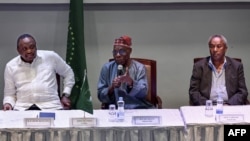Ethiopia's federal government and Tigray regional leaders began meeting in the Kenyan capital, Nairobi, Monday for talks on an African-Union brokered peace deal signed last week in South Africa. The parties are discussing how to implement the deal and get much-needed food and medical aid to areas cut off by two years of war.
Ethiopian government representatives and the leadership of the Tigray People's Liberation Front are meeting to implement the peace agreement that has given Ethiopian civilians trapped in the conflict new hope.
Former Nigerian President Olusegun Obasanjo and Uhuru Kenyatta, former Kenyan president, are chairing the talks.
Tigray spokesperson Getachew Reda says implementing the peace agreement will create more opportunities for the country.
"There are a number of things that need to be done which are stipulated in our agreement. The provision of services is one thing, the more services there are, the more confidence, the more communication there is and the more hope and expectation in people’s minds and that will further consolidate the peace we are trying to put in place. We are committed to honor the commitment we made,” he said.
The deal calls for an end to the two-year conflict and the delivery of humanitarian assistance to the people in the Tigray region.
The Ethiopian government’s lead negotiator Redwan Hussein said it’s a priority to reconnect the Tigray community with the rest of the country.
“In areas where we don’t have access, we have to quickly reconnect services to telecom, energy and banking systems. But before that, our people need food and medicine, and we are trying to expedite that,” he said.
The war has displaced millions and killed tens of thousands more. The conflict has made it difficult for aid agencies to reach millions in the Tigray region with food and medical supplies.
The agreement also calls for the TPLF to lay down its arms in exchange for reintegration and the return of the national army to the region.
Tigray representatives say they have made a painful concession to end the conflict.
Obasanjo, the African Union’s chief mediator, said the two sides have established a telephone hotline. The hotline will help them monitor the truce and communicate with their forces to stop fighting in case of flare-ups.
Kenyatta, a co-mediator of the peace talks, says he expects the ongoing negotiations to end the civil war.
“At the conclusion of this process will be colleagues who will be working together for the betterment of their country, for the betterment of Ethiopia, for the benefit of our region and ultimately join us all in our struggle to make Africa a better place and to end and silence the guns permanently, so that we can focus on the well-being of our people,” he said.
The talks are expected to last three or four days.






